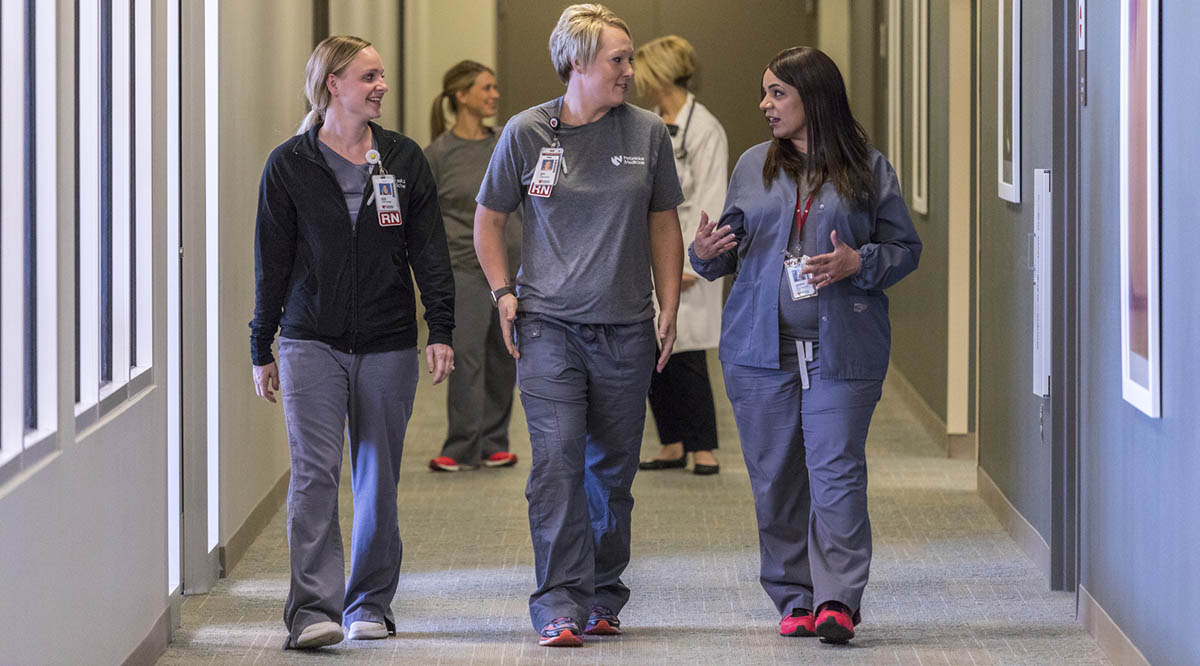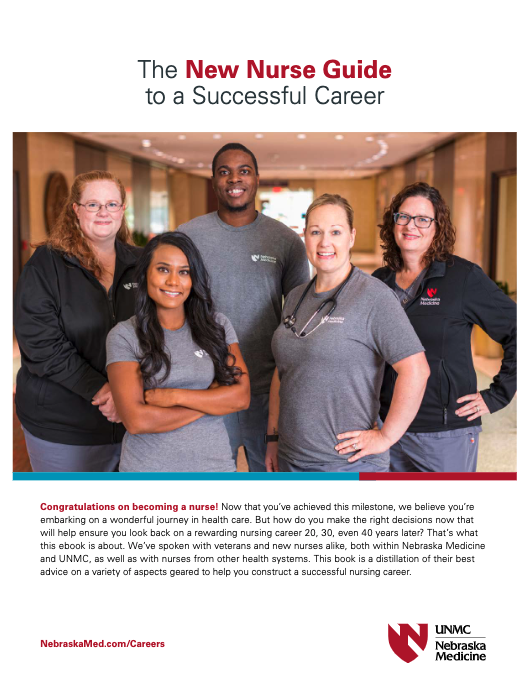10 most critical soft skills for nurses

The role of soft skills in nursing cannot be overstated. To be the best nurse you can be requires not only superior clinical skills but also key soft skills that will allow you to be a more confident and effective nurse.
Most nurses have accomplished the hard skills of nursing – clinical skills or competencies like performing tasks such as taking vital signs, administering medications or performing an intravenous (IV) insertion. But just as important to quality patient care are the soft skills of nursing that can lead to a more productive work environment and higher job satisfaction.
The following is a list of the top 10 soft skills recommended by Nebraska Medicine nurses that will not only help you be a better nurse, but will foster a productive, collaborative and healthy work environment.
1. Communication
Effective communication with both patients and colleagues is one of the most important skills nurses need to learn in terms of providing good patient care.
Communicating with patients will help you develop trust and rapport, which will contribute to an effective working relationship and allow patients to become an active partner in their treatment. Active listening is an important part of communicating. Most patients want to be heard and know that you are interested and care about what they have to say. Making eye contact and listening without interrupting will go a long way in letting your patients know you respect them and acknowledge their concerns.
“Patients need nurses to remember that they are a person, not just a room number,” says Richard Villareal, BSN, RN, nurse supervisor for the Solid Organ Transplant Unit. “They need to understand the care they’re receiving so they can make informed decisions. When I first started nursing, I was very task focused. As a new nurse it can be hard to see how important it is to take the time to effectively communicate and connect with patients and other staff – skills that are under taught and not given enough attention during nursing school.”
Effective communication with your colleagues is also critical and will help you work more efficiently. There will be times when you need to navigate through complex and difficult conversations so communication and listening skills will be critical. Villareal suggests using the “read or teach back” method to confirm your colleague understands what is being explained to them. After you have provided them instructions, have them repeat it back to you. This is also an effective technique to use when teaching patients and family members, he says.
Communicating to doctors can be an intimidating experience for new nurses. “The key to ensuring an effective conversation with a physician when relaying patient information, is to do your homework first,” notes Villareal. “Make sure you have all the critical information you need to provide a comprehensive review of the patient’s condition. For example, if the patient’s blood pressure is out of range, do a manual check and evaluate the patient in person first. Talk to the patient to see how he or she is feeling.”
2. Showing empathy
“It’s soft skills like showing empathy that fill your bucket,” says Joshua Beerman, BSN, RN, nurse supervisor on the Solid Organ Transplant Unit. “While it’s definitely a juggling act trying to get everything done, making time to spend with your patients should be a priority. It may be necessary to reset occasionally and remember the reason you are in nursing.”
Beerman suggests using those spare moments throughout the day to sit down next to your patient and focus just on them. “This is a moment in their lives where they may need that kind word or a familiar face to get through the day,” he says. “When the doctor is in the room and is talking to the patient, sit with them and be there with them when he delivers the good or bad news.”
Derek McCroy, MHA, BSN, RN, ambulatory supervisor for Pre-surgical Screening and Surgery Scheduling, can’t stress enough the value of getting to know your patients. “Patients can be scared, alone and unsure of what is happening to them,” he says. “Even if you only have a couple of minutes after you finish your tasks, pull up a chair next to their bed and ask them about their life. Patients love to have someone to talk to, especially in their most vulnerable time. They want to know you care. They want to know someone is listening and most of all, they need to have trust in you. Learn about their family too and be sure to take care of their visitors.”
Showing empathy and compassion to your colleagues is also important. “We all have bad days or times when we lose a patient and it hits us hard,” says Amy Moore, BSN, RN, clinical nurse on the Neurology floor. “Be there for your fellow colleagues. Listen to them. Give them a break and a chance to regroup. Helping each other when we can is what it’s all about. We’re all in this together.”
Showing empathy can be difficult when patients are disrespectful, difficult or even violent, says Villarreal. But for these patients, it is even more important to be empathetic and provide the best care we can despite their attitude or behavior. Villarreal offers these tips for dealing with difficult patients or situations:
- Don’t make assumptions. You don’t know the intent of someone’s actions. Use your communication skills to find out more information before you act
- Focus on facts. Things can get twisted and misinterpreted fairly quickly. When you are faced with a difficult and uncertain situation, focus on the facts and what you can do to help. Listening to rumors or things you can’t substantiate, typically make matters worse for everyone
- Don’t react to their anger. If a patient is personally attacking you, don’t take it personally and try not to react to their anger. Sometimes you just need to take a few minutes to listen to a patient’s frustrations. Acknowledging them may make all the difference in the world in terms of their disposition and many times you may find that you can help change the situation so they will have a better day tomorrow.”
3. Emotional intelligence
Nursing can be a challenging and emotional job. Emotional intelligence entails being self-aware of your own emotions and having the capacity to control them and express yourself.
“If you’re overloaded or burnt out, you need to recognize this and allow yourself some downtime to refresh and regroup whether that means taking a break or taking some time off,” according to Villarreal.
4. Teamwork
Teamwork is essential on every unit. “A single nurse cannot do it all alone,” Villarreal says. “It takes the entire team. There can be a lot of stress and emotion on a unit, but that can be reduced when we act as a team. If you are free, offer to help a colleague. If you need help, don’t be afraid to ask for help or delegate tasks to support staff. Acknowledge your feelings or concerns and remember we are here to help each other.”
5. Clinical judgment and problem-solving skills
“Critical thinking skills are the holy grail of nursing,” says Kylie Byman, MS, RN, who works on the Neonatal Intensive Care Unit. “Thinking on your feet and problem-solving is what it’s all about.”
But this a skill that often takes time, knowledge and experience to develop. To foster these skills, “always be open to learn and watch new things,” says Byman. “Soak in every new experience because that’s how you’re going to develop these important skills. In nursing, you will learn more by doing than you will ever learn from just reading a book.”
6. Adaptability
No two days are ever the same, making adaptability critical for new nurses. “We have to be ready for anything and everything,” says Katelyn Keefer, BSN, medical/surgical nurse.
Having days where you have one patient who is not doing well can throw off your entire routine. It’s not uncommon, she says. “That’s where teamwork is really important. You need to be able and willing to adapt and delegate tasks to other nurses to help you.”
7. Initiative
As a new nurse, the ability to take initiative is something that will grow with time. “It can be hard as a new nurse, but as you care for more patients, you will develop a larger experience base that will allow you to be more confident in your knowledge and skills,” says Byman. “When in doubt, don’t be afraid to use other nurses to help guide you to build your confidence. We are all working toward the same goal.”
New nurses can offer a fresh set of eyes to how things are being done. “You are invaluable for providing feedback on current processes and procedures,” says Villareal. “Ask any and all questions that you have. Challenge the status quo. Just because the hospital currently does things a certain way, does not mean that it is the best and most efficient way to perform. Here at Nebraska Medicine, innovation is one of our values for a reason. We want to continuously critique how we perform and continuously improve.”
8. Attitude and confidence
“Attitude is everything,” says Keefer. “If you try to start each day with a positive attitude and optimism, the little things that go wrong won’t seem so bad. Negativism will lead to burnout and creates a toxic environment for everyone.”
Part of maintaining positivity requires dealing with your emotions. “It’s important to vent and acknowledge your feelings, but then you need to be able to pick yourself up and keep going,” she says.
Having the confidence to step up and take control of the situation when needed, is a crucial skill in nursing. “We are the eyes and ears for the doctor,” says Keefer. “We are the patient’s’ strongest advocate and the doctor relies on us to keep them abreast of their condition.”
That confidence needs to carry over when talking to doctors and relaying important patient information. “If you’re unsure about a patient, talk to another nurse to get a voice of confidence,” she says. “Do your assessment, gather all the facts you need, write it down and rehearse it first, if necessary. Use the acronym SBAR – situation, background, assessment and recommendations to make sure you have all the information you need.”
9. Networking
Your relationships with other colleagues and ancillary staff can help you on both a personal and professional level.
Forming positive relationships with colleagues can help you provide better collaborative care. Getting involved in committees and other groups will broaden your horizons and may open the doors to other opportunities in nursing. Forging positive relationships with your peers and managers can serve as a resource for growth and advancement.
“I didn’t realize the importance of networking early on but I now realize that developing relationships with nurses throughout the institution helps develop trust and gives you more confidence in yourself,” says Byman.
Remember that everyone is working in collaboration to care for patients. “If you have questions about respiratory medications or treatments, reach out to Respiratory Therapy,” says Villareal. “If you have questions about an MRI that one of your patients will have done, call MRI. They will be glad to help. Become comfortable talking to different departments throughout the hospital because they are all important resources that will help you throughout your entire nursing career.”
10. Organization and time management
Organization and time management will improve your efficiency and effectiveness.
Keefer suggests taking a few minutes in the morning to develop a basic plan for the day that includes a checklist of tasks for each patient. If you get off task, go back to your list and reprioritize, she says.
“I still write everything down to help me stay organized,” says Byman. “When I feel organized, I enjoy my job more, I’m more efficient and I feel less stressed.”
Staying organized also means being able to adapt and change as the day unfolds. “There will always be hiccups in your plan, so embracing the challenges and overcoming obstacles is an important aspect of time management and organization,” says Villareal. “Keep in mind that your plan is always fluid and in constant motion. Rarely are there nights that I have a plan and I am able to complete it without any changes.”





